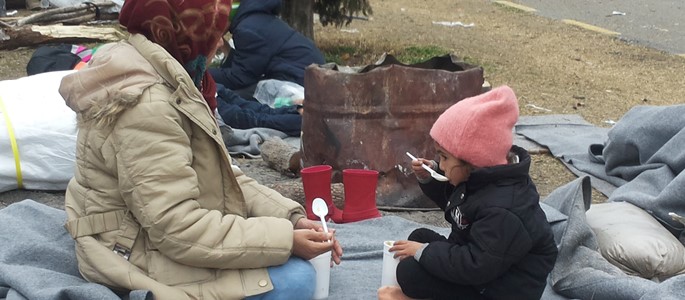Refugee children not able to meet demand for DNA test
Many refugees residing in Denmark have children staying in a country with no Danish embassy, and without the right papers they can't prove the kinship
Refugees have very often lost their marriage certificates or the birth certificates for their children – either during war bombings, because of sudden departure from the home with no time to pack, or because luggage was thrown overboard or stolen during the journey to Europe. It may also be very difficult to get hold of such documents again, once your have left your home country.
And this can turn out to be fatal, when families are separated and seek to be reunited. Then you must prove that these children are actually your own. Danish Immigration Service demands a DNA test, if you don't have all the right documents.
From December 2014 to February 2016, Danish Immigration Service has asked for such a test from 495 persons in cases concerning family reunification for children. Out of those, the test was made in 230 cases. Which means that 265 persons – or well over 50% – for some reason did not take the test. Of the 230 who took the test, 90% proved the kinship and led to family reunification in Denmark. (source: Immigration Service)
The problem, and probably the main reason why so many don't make the test, is that most of the children concerned are staying in countries without a Danish embassy: i.e. Syria, Afghanistan, Iraq and Eritrea. The Danish consulates do not handle DNA tests, and our Nordic neighbour countries are not very interested in collaboration on these issues.
MetroXpress has made a feature story about the problem, and they talked to Ahmad from Syria, who has asylum in Denmark. He has not seen his children for two years, and they no longer care to talk to him on the phone. His wife and their three children are living in a refugee camp in Jordan, and they have no passports. Therefore they are not allowed to travel to a Danish embassy in i.e. Lebanon, Saudi Arabia, Israel or Turkey.
The family has informed the Danish authorities that it is not possible for them to make a DNA test, as they do not have the required travel documents to leave Jordan. But Immigration Service maintains the demand and refuses to grant the family permission to travel to Denmark – a so-called 'laissez-passer' – to make the DNA test on Danish soil.
At the same time, Ahmad is not able to travel back to Jordan to see his family, because the Jordanian authorities issued a ban on entry when he left the country back in 2014, with the hope of getting asylum and family reunification in a European country.
Claus Juul, legal consultant for Amnesty International Denmark, criticizes the practice of Immigration Service in MetroXpress. He thinks that in the mentioned case a permit should be given to the mother and the three children to enter Denmark and have the test here. Simply because there are good reasons why they don't have the right papers: there is a war in their country and they are on the run.
Professor of law at Aarhus University Jens Vedsted-Hansen agrees. The authorities should not set up impossible obstacles, and there is a limit to how much the family can do to cooperate, he says, and wonders why the Danish consulate in Amman could not be used for this.
Refugees Welcome, who provides legal counselling to refugees, mentions another example of a refugee from Eritrea who has asylum in Denmark. He applied to have his 12-year-old son up here. He was divorced from the mother, and she also left the home country, but was rejected in another country. Therefore the son is living with his grandmother, who is old and sick now.
Immigration Service's reply was that even though both father and son have passports and there is a birth certificate with the name of the father on it, they both have to make a DNA test because the parents are divorced. But the nearest Danish embassy is in Ethiopia, and leaving Eritrea is not allowed. So, the father must arrange an illegal (and dangerous) smuggling of the child across the border, and also arrange how the child can stay in Ethiopia during the 10 months that the processing time will be in Denmark. The child still risks a rejection, after this long procedure.
In this way, the demand from the authorities becomes a practical barrier that the refugees are not able to overcome, and they will remain separated in spite of their right, secured by international conventions, to be reunited.


